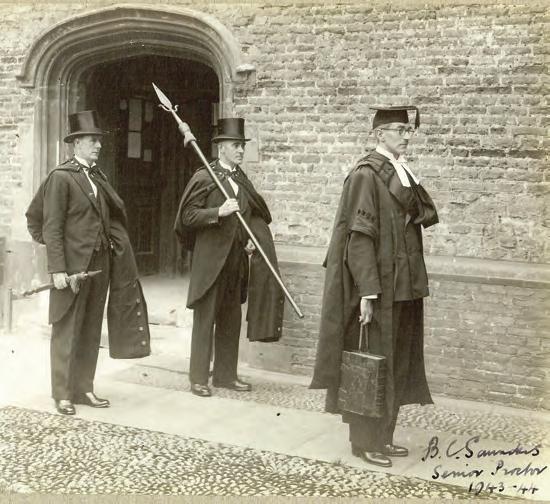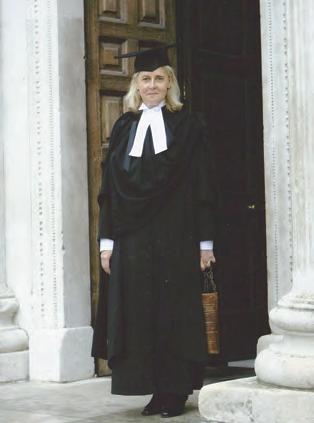
6 minute read
It’s a Proctor’s Life…: Dr Christina Skott
it’s a proctor’s life…
Dr Christina Skott, Joint Director of Studies in History, reflects on her year as the University’s Junior Proctor.
Advertisement
Honorary Degree Procession 2013. Dr Skott is carrying the Statutes of the University in her left hand. I have to admit that when the Master approached me in the spring of 2011 to fulfil Magdalene’s cyclical obligation to nominate a candidate for the office of University Proctor for three years I was flattered, but also slightly hesitant. Had I known then that I would be covered in ‘champagne’ spray, flour, and sticky string twice a day throughout the Tripos exam period, I might have turned him down; this year has been particularly bad for this infection from ‘the other place’! Add to this, long hours in the Senate House on Degree days, scrutinising the constitutions and accounts of 400 university societies, in addition to the day job of teaching history, I soon wondered whether I had made a wise decision. However, with two years of my three completed, I can say with all honesty that it has been an extraordinary experience, and one that I would not have missed.
The office of Proctor is one of the oldest in the University, dating back to the thirteenth century. Every college must provide a Proctor according to a pre - determined cycle; this means that before my appointment, the last Magdalene Proctor, Frank King, served in 2000–01. There are a Junior and a Senior Proctor in every year, having first been appointed Pro-Proctors in their first year of office to learn the job, and then as Deputy Proctors following their year of office. The title of ‘Junior’ or ‘Senior’ depends on the length of time each has been a member of Regent House. The job of the Proctors is to ensure that those in statu pupillari fulfil the obligations of discipline laid down in the University Statutes and Ordinances, and to be part of the process of scrutiny by which the University monitors its own
administration and executive functions. The Proctors have a major part to play in all aspects of the ancient ceremonial by which the University conducts its public business, the giving of degrees and the election and installation of its senior officers.
My ceremonial duties as a Junior Proctor this year have ranged from the routine, such as Congregations where degrees are admitted by the ViceChancellor or his deputies, to special events such as the election and installation of the new Chancellor and the visit to Cambridge by the Duke and Duchess of Cambridge. These grand occasions include the annual conferring of Honorary Degrees to the world’s most distinguished scholars and cultural celebrities. On student degree days, the Proctors ensure that college Praelectors present their students for degrees dressed according to Ordinances. Graduands who appear, for example, in red socks, dangling ear rings, or mini-skirts, may result in ejection from the Senate House and in any case a fine for the Praelector, consisting of bottles of port. In the past, a Praelector who presented, in perfect Latin, a toy penguin for a degree in philosophy was fined a whole case! In performing their ceremonial duties, Proctors wear three variations of a distinctive form of many layered academical dress. They carry the chained leather bound Statutes of the University on all ceremonial occasions as their insignia of office.

Dr B C Saunders as Senior Proctor 1943–44

Junior Proctor 2012–13
The Proctors also have the ceremonial assistance of the University Constables, who are no longer required to check the weights and measures used by traders in the market, or the activities of professional ‘ladies of the night’, but none the less provide ceremonial gravitas. The Proctors also call on the Constables to provide a reassuring presence during student protests. On such occasions, breaches of University regulations can result in fines or a reference to the University Advocate who may prosecute the individuals concerned.
At a more routine level, the Proctors sit in on all meetings of the University Council and Discussions of the Regent House. They are members of important administrative bodies such as the Board of Scrutiny, the Board of Examinations and the University’s Security Group. They are responsible for ensuring the correct procedures at all University examinations, and undertake ‘exam walking’ throughout the Tripos examination period, which includes the Lent and Easter Terms. During exams, they attempt to visit as many sites as possible where an examination is held, including exam halls, colleges and faculties, and the Senior Proctor is responsible for the investigation of any alleged plagiarism.
The ceremonial and administrative roles of the Proctors are roughly divided between the Senior Proctor, who deals with individual disciplinary matters and the exam process, and the Junior Proctor who has responsibility for the registration and oversight of University clubs and societies, of which there are currently about 400. In practice, the Junior Proctor is consulted by societies on a variety of matters, and is often called upon to solve internal disputes within societies. The Junior Proctor also has special responsibility for Student Unions,
and is the independent investigator into complaints by members of the Unions. The Junior Proctor is also an ex officio member of the Council Committee for the Supervision of Student Unions, the Societies Syndicate, and chairs its Technical Committee which gives grants from the University to individual clubs and societies.
In summary, the Proctorial workload turned out to be greater than I had first expected! I was also blissfully unaware that 2012–13 was going to be such a turbulent one for the Junior Proctor’s principal responsibilities. The University’s decision to extend its own charitable status to compliant and registered societies has found many clubs and societies in default and in need of legal advice and counsel from the Junior Proctor. The much publicised turmoil in the Graduate Union has also taken up many hours of the Proctor’s time. As mentioned earlier, the academical year finished off with an acceleration of the ‘Oxford disease’ seen in recent years in which students are greeted outside their last exam venue by large crowds of their friends armed with bottles of fizzy liquid, and frequently flour and eggs. Whilst Oxford students are restricted by the geography of their exam venue to university premises, the problem in Cambridge becomes much worse when the property and persons of the general public become victims, for example outside the Guildhall. Any attempt by the Proctors to control this ‘natural exuberance’ has been met with a face full of fizz and a shower of flour. Even the presence of burly University constables has been little or no deterrent.
On the lighter side, and there is one! The opportunity to observe the workings of this ancient and world-class institution at close quarters, warts and all, is an enormous privilege and, in spite of the cleaning bills, a great pleasure. I have taken part in civic ceremonies which link the University to both the City and the county of Cambridgeshire, and have recently had the unique experience of representing the University at the Queen’s Garden Party at Buckingham Palace. In December, I had the pleasure of hosting ‘the Senate House Feast’ in Magdalene, an annual opportunity for the Proctors to recognise the team effort of all those who contribute to the smooth running of the ceremonial year and all the activities which take place in the Senate House.
All University ceremonial which involves the Proctors, has this year started from my room in Benson Court where the medieval weapons of the Constables are stored, before we process to the Senate House in sunshine, rain, sleet or snow (pacesleeping students!). Above all, it is a special bonus to view from my privileged seat on the dais of the Senate House, the Magdalene students, especially our historians, as they come forward to receive the Deputy Vice-Chancellor’s ‘admitto te’ to signify their successful graduation to the delight and often amazement of many happy parents. All the marching, exam walking, flour and fizz cannot detract from this magic moment in the year of the Junior Proctor. C S








